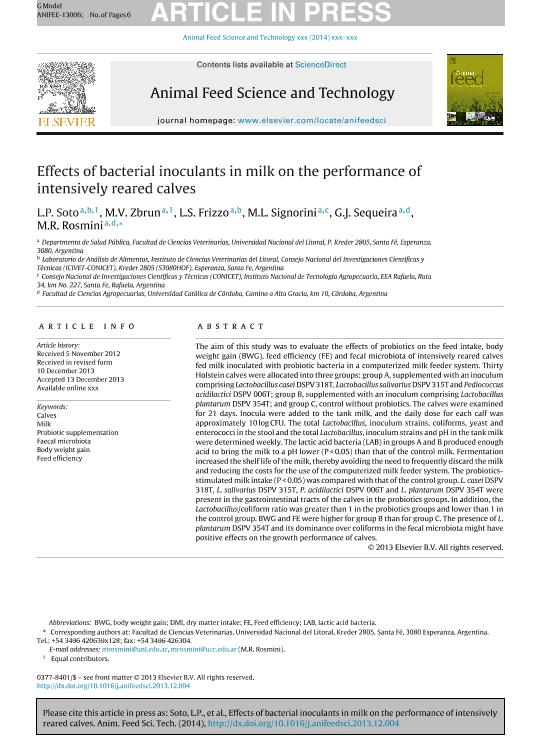Mostrar el registro sencillo del ítem
dc.contributor.author
Soto, Lorena Paola

dc.contributor.author
Zbrun, María Virginia

dc.contributor.author
Frizzo, Laureano Sebastian

dc.contributor.author
Signorini Porchietto, Marcelo Lisandro

dc.contributor.author
Sequeira, Gabriel Jorge

dc.contributor.author
Rosmini, Marcelo Raul

dc.date.available
2017-12-18T20:54:49Z
dc.date.issued
2013-12
dc.identifier.citation
Rosmini, Marcelo Raul; Sequeira, Gabriel Jorge; Signorini Porchietto, Marcelo Lisandro; Zbrun, María Virginia; Soto, Lorena Paola; Frizzo, Laureano Sebastian; et al.; Effects of bacterial inoculants in milk on the performance of intensively reared calves; Elsevier; Animal Feed Science and Technology; 189; 12-2013; 117-122
dc.identifier.issn
0377-8401
dc.identifier.uri
http://hdl.handle.net/11336/30992
dc.description.abstract
The aim of this study was to evaluate the effects of probiotics on the feed intake, body weight gain (BWG), feed efficiency (FE) and fecal microbiota of intensively reared calves fed milk inoculated with probiotic bacteria in a computerized milk feeder system. Thirty Holstein calves were allocated into three groups: group A, supplemented with an inoculum comprising Lactobacillus casei DSPV 318T, Lactobacillus salivarius DSPV 315T and Pediococcus acidilactici DSPV 006T; group B, supplemented with an inoculum comprising Lactobacillus plantarum DSPV 354T; and group C, control without probiotics. The calves were examined for 21 days. Inocula were added to the tank milk, and the daily dose for each calf was approximately 10 log CFU. The total Lactobacillus, inoculum strains, coliforms, yeast and enterococci in the stool and the total Lactobacillus, inoculum strains and pH in the tank milk were determined weekly. The lactic acid bacteria (LAB) in groups A and B produced enough acid to bring the milk to a pH lower (P < 0.05) than that of the control milk. Fermentation increased the shelf life of the milk, thereby avoiding the need to frequently discard the milk and reducing the costs for the use of the computerized milk feeder system. The probiotics-stimulated milk intake (P < 0.05) was compared with that of the control group. L. casei DSPV 318T, L. salivarius DSPV 315T, P. acidilactici DSPV 006T and L. plantarum DSPV 354T were present in the gastrointestinal tracts of the calves in the probiotics groups. In addition, the Lactobacillus/coliform ratio was greater than 1 in the probiotics groups and lower than 1 in the control group. BWG and FE were higher for group B than for group C. The presence of L. plantarum DSPV 354T and its dominance over coliforms in the fecal microbiota might have positive effects on the growth performance of calves.
dc.format
application/pdf
dc.language.iso
eng
dc.publisher
Elsevier

dc.rights
info:eu-repo/semantics/openAccess
dc.rights.uri
https://creativecommons.org/licenses/by-nc-nd/2.5/ar/
dc.subject
Calves
dc.subject
Milk
dc.subject
Probiotic Supplementation
dc.subject
Faecal Microbiota
dc.subject
Body Weight Gain
dc.subject
Feed Efficiency
dc.subject.classification
Otras Biotecnología Agropecuaria

dc.subject.classification
Biotecnología Agropecuaria

dc.subject.classification
CIENCIAS AGRÍCOLAS

dc.title
Effects of bacterial inoculants in milk on the performance of intensively reared calves
dc.type
info:eu-repo/semantics/article
dc.type
info:ar-repo/semantics/artículo
dc.type
info:eu-repo/semantics/publishedVersion
dc.date.updated
2017-12-18T15:09:42Z
dc.journal.volume
189
dc.journal.pagination
117-122
dc.journal.pais
Países Bajos

dc.journal.ciudad
Ámsterdam
dc.description.fil
Fil: Soto, Lorena Paola. Consejo Nacional de Investigaciones Científicas y Técnicas. Centro Científico Tecnológico Conicet - Santa Fe. Instituto de Ciencias Veterinarias del Litoral. Universidad Nacional del Litoral. Facultad de Ciencias Veterinarias. Instituto de Ciencias Veterinarias del Litoral; Argentina
dc.description.fil
Fil: Zbrun, María Virginia. Consejo Nacional de Investigaciones Científicas y Técnicas. Centro Científico Tecnológico Conicet - Santa Fe; Argentina. Universidad Nacional del Litoral. Facultad de Ciencias Veterinarias; Argentina
dc.description.fil
Fil: Frizzo, Laureano Sebastian. Consejo Nacional de Investigaciones Científicas y Técnicas. Centro Científico Tecnológico Conicet - Santa Fe. Instituto de Ciencias Veterinarias del Litoral. Universidad Nacional del Litoral. Facultad de Ciencias Veterinarias. Instituto de Ciencias Veterinarias del Litoral; Argentina
dc.description.fil
Fil: Signorini Porchietto, Marcelo Lisandro. Consejo Nacional de Investigaciones Científicas y Técnicas. Centro Científico Tecnológico Conicet - Santa Fe. Instituto de Ciencias Veterinarias del Litoral. Universidad Nacional del Litoral. Facultad de Ciencias Veterinarias. Instituto de Ciencias Veterinarias del Litoral; Argentina. Instituto Nacional de Tecnología Agropecuaria. Centro Regional Santa Fe. Estación Experimental Agropecuaria Rafaela; Argentina
dc.description.fil
Fil: Sequeira, Gabriel Jorge. Universidad Nacional del Litoral. Facultad de Ciencias Veterinarias; Argentina. Consejo Nacional de Investigaciones Científicas y Técnicas. Centro Científico Tecnológico Conicet - Santa Fe; Argentina. Universidad Católica de Córdoba. Facultad de Ciencias Agropecuarias; Argentina
dc.description.fil
Fil: Rosmini, Marcelo Raul. Consejo Nacional de Investigaciones Científicas y Técnicas. Centro Científico Tecnológico Conicet - Santa Fe; Argentina. Universidad Católica de Córdoba. Facultad de Ciencias Agropecuarias; Argentina. Universidad Nacional del Litoral. Facultad de Ciencias Veterinarias; Argentina
dc.journal.title
Animal Feed Science and Technology

dc.relation.alternativeid
info:eu-repo/semantics/altIdentifier/doi/http://dx.doi.org/10.1016/j.anifeedsci.2013.12.004
dc.relation.alternativeid
info:eu-repo/semantics/altIdentifier/url/http://www.sciencedirect.com/science/article/pii/S0377840113003519
Archivos asociados
